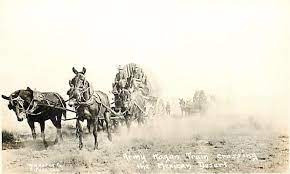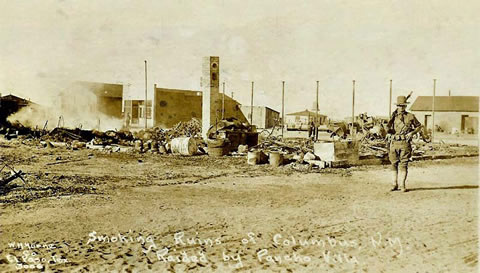 The clock at the Columbus train station, stopped at the time of the attack by a bullet. It is now in the museum at Pancho Villa State Park.
The clock at the Columbus train station, stopped at the time of the attack by a bullet. It is now in the museum at Pancho Villa State Park. The attack came after a long period of Mexican political unrest and may have been caused by Villa's frustration that President Woodrow Wilson and the American government had chosen to recognize a political rival, Venustiano Carranza, and help him win the election and become President of Mexico. Villa, who had been supported by the U.S. in the past, was also desperate supplies for his beleaguered army and may have thought that Columbus and the nearby Army camp would be a good place to get what he needed.

By April 8th, General Pershing's force of over six thousand had traveled four hundred miles into Mexico. There they established a base in the town of Colonia Dublan. The U.S. Army had never before attempted anything of this magnitude, and the logistics of supplying Camp Dublan proved difficult.
President Wilson had assumed that the Mexican government would support a raid intended to capture Pancho Villa. Instead, Mexico refused to offer the U.S. expedition any aid. This included denying the U.S. the use of the Mexican Northwestern Railway to transport supplies. Food and supplies were brought in by horse and mule trains. Soon, the whole operation was at a standstill.
 Jeffery quads in Mexico.
Jeffery quads in Mexico.  Officers breakfast, Camp Dublan
Officers breakfast, Camp Dublan 
General Black Jack Pershing crossed back into the United States and parade triumphantly through the streets of Columbus with 10,690 soldiers and some 2,700 refugees. Two hundred of the refugees were Americans who had owned ranches south of the border. Another five hundred were Chinese immigrants who faced discrimination in Mexico and were moving north in search of a better life. The remaining two thousand were Mexican citizens escaping the violence of their country’s long civil war.
The fact that Pershing’s Army brought back so many refugees proved that Mexico remained a dangerous place. Although depleted by casualties and desertion and not the menace they had been, Pancho Villa and his Villistas were still on the loose.



